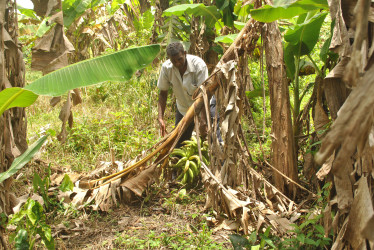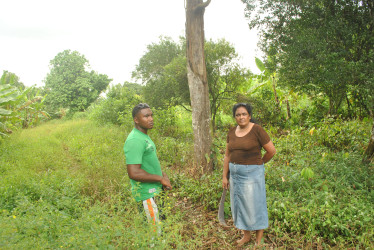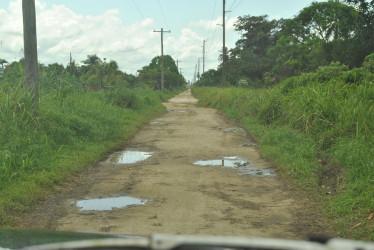Think of the Garden of Eden and the biblical fields of plenty come to mind. That is the goal which the similarly named farming community on the East Bank Demerara had set itself. It is home to approximately 800 residents of predominantly Indian and Amerindian decent. The community exudes a distinct sense of peace and serenity, encompassing as it does acres of fruit trees, vegetables, ground provisions and livestock. The realization of its potential, however, has, over the years, been hamstrung by a circumstance of chronic official neglect.

When Stabroek Business managed to negotiate the utterly disgraceful access road en route to the farms and homes of the community the residents shared their ‘journeys’ from their previous lives to their Garden of Eden. Farmer, Bissoondial Boopath said that he had been a resident here since “Dr. Jagan’s time” as Premier when cattle owners and farmers living in Bel Air Gardens were relocated. Dr. Jagan, he said, saw Garden of Eden as an appropriate location for farming rather than cattle roaming in urban and sub-urban areas.
Boopath said that initially residents were required to pay rental fees for the lands they occupied but they eventually received certificates of title to those lands. These days they pay only rates and taxes.
Livelihoods in Garden of Eden depend predominantly on cattle and poultry-rearing and horticulture. The community enjoys potable water, light and telephone services.
Boopath, one of the oldest members of the community, has been living at Garden of Eden for the past fifty-three years. He recounted what he considers to be his “days of glory, all those years ago,” he says, when he used to supply more than 300 tons of cane to the Diamond Estate. Then, the cane was moved via the canal that snakes its way from the farmlands to the estate. After the estate had closed in 1989 cattle-rearing and poultry-rearing and vegetable farming replaced cane cultivation.
The need to move farming produce by road has arisen out of the fact that as the community has become more populated a series of bridges have been built across the canal. It can no longer serve as a means of transport and the farm produce must now be moved to market by road.
That is where the trials of the farmers of Garden of Eden begun. Boopath says that over time no significant official attention has been paid to upkeeping the roads, canal and drainage system. “As a farmer producing over 30 gallons of milk … I can’t get it to customers because de road bad ….vehicles don’t want to come in and I can only deliver some of it on bicycle to people close by.” The upshot of this has been millions of dollars in spoilage over time.
Garden of Eden, Boopath says, possesses significant under-realized production potential that cannot be taken advantage of in view of the problem of farm-to-market transport.
Other residents, vehicle owners, shared with Stabroek Business the challenge of high maintenance costs that go towards repairing and replacing damaged vehicle.
Scant attention


Boopath told Stabroek Business that for more than two decades the Neighbourhood Democratic Council (N.D.C), has paid scant attention to the community’s roads and waterways. Such modest remedial work as has been done recently has been due to a community fund-raising Barbecue.
Ramkissoon `Milkman’ Persaud another resident, lives with his wife, four sons and their wives. “Living in Garden of Eden is very good, peaceful and quiet” he says. The family cultivates fruits and vegetables and rears cows. Persaud says that over the years his herd has declined from upward of 100 cows to around twenty five cows these days. He blames poor drainage, pointing out that when it rains the canals are flooded and the pasture and canals become one. When that happens there are no grazing grounds. In their foraging search for food the cows often get stuck in swampy areas and die there.
Persaud also points out that while the cattle serve to manure the lands, once it rains the nutrients are washed away. He too says that for years the NDC has paid no attention to the issues that undermine farming at Garden of Eden despite years of strenuous representation by residents. Much of what is accomplished, he asserts, is done through the self-help efforts of the community.
Livestock losses are not ‘Milkman’s’ only headache. Every three weeks he must find $20,000-$25,000 to meet the cost of transporting wheat and copra meal to nourish his herd. The high cost, he says, has to do with the deplorable condition of the road and the reluctance of vehicle owners to use it. Persaud’s sons, however, must use the road to deliver milk on bicycles to villagers and to neighbouring communities. Understandably, the quantities of milk that can be delivered are limited and much of the remainder is spoilt.
Elsewhere in the village Stabroek Business spoke to Eugenia who has been living in Garden of Eden for the past twelve years with her two children ages 14 and 9. Eugenia’s day begins at 4am when she starts preparing meals for her family and tending her garden which she cultivates to supplement her income. “Every day my children leave at 6:30am to walk the distance of one mile and three quarters to the main road with slippers on their feet. Then they would freshen up and put on school attire and take a bus to Friendship Secondary and Craig Primary respectively,” she explained. If residents do not have their own vehicles walking to the main road is the only option.
Naomi Peters, who has been a Garden of Eden resident for the past 40 years, lives there with her four children. They cultivate coconuts, oranges, plantains, banana, and breadfruit. She recalls that her own children once trekked the same access road to get to school. When it rains, she says, the conditions are even more ‘hellish.’
Like the other farmers Peters wants the authorities to bring a sense of stability to the community. She wants the stagnant drains and bad roads to be addressed. She believes that once that happens Garden of Eden can thrive as a farming community once again.
Philosophy
“Plant something, wait a little while, and be able to earn an extra income” is the philosophy of Joseph Bonnett, who has been residing at Garden of Eden there for the past 32 years. Bonnett was born at Wakenaam but grew up in Georgetown. After completing high school he learnt several skills including book binding, and tailoring. For a while he worked at Sankar’s Estate.
It was there that he developed an interest in farming. While there he sought to develop himself in a manner to be able to subsidize his income and turned to farming.
At Garden of Eden he began with 100 coffee plants, 40 coconut trees and 100 citrus trees. Afterwards he cultivated sugar cane for the Diamond Estate until it was closed down. Subsequently, he planted 10 and a half acres of cassava but the floodwaters destroyed them.
Now an experienced and capable farmer, Bonnett believes in the potential of Garden of Eden. It is, he says, primarily the state of the access road and the difficulties being experienced in getting produce to market that is stifling that potential.
It was Bonnett, primarily, who persuaded Stabroek Business to pay an interest in the plight of the farming community of Garden of Eden.
He argues that at this time when maximizing food production is one of the proclaimed pursuits of any government it is a harsh contradiction in terms that official neglect has been the primary stumbling block to the growth of a potentially profitable farming community. “We need to engage the NDC in this discourse,” Bonnett says. That is a conversation which the Stabroek Business has undertaken to have with the local officials there.
The community members all shared the sentiments that the Garden of Eden can return to its former glory with some attention for the relevant authorities. The producing potential can be maximized and achieve its greatest potential with a better drainage system, cleaning of the canals, and better roads.





